We’ve looked at the data around how these teams have arrived into the tournament, and how they’ve performed during it, to assess each of their chances. We’ve summarised below the argument for each remaining semi-finalist progressing.
The Woman’s World Cup Semi-Finalist
Click the links below to quickly dive into the data to see why each semi-finalist may win.
Spain 
Spain are going to win because they have the highest quality of player in the tournament, and have been able to bring the strongest squad onto the pitch in each of their games.
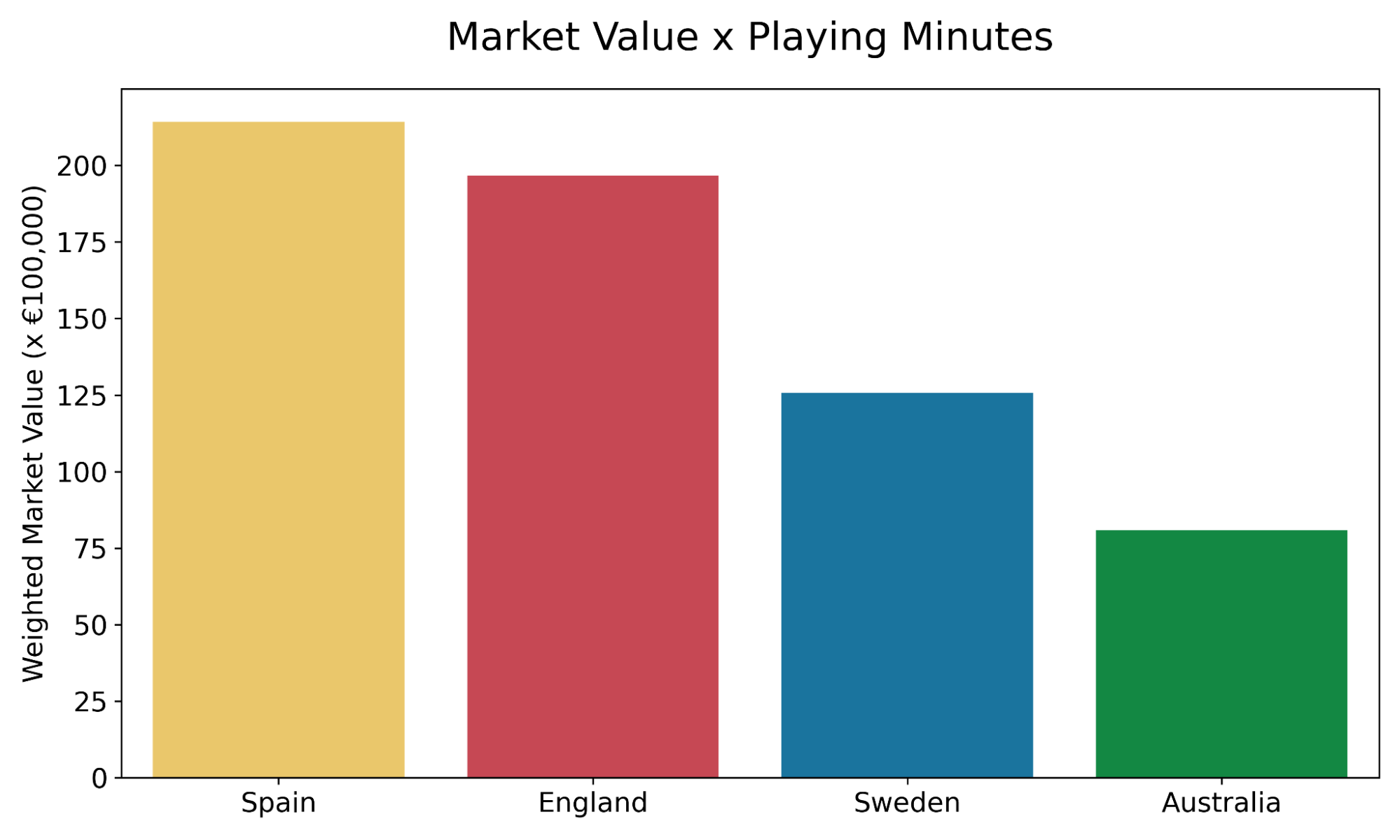
They also have the most cohesive squad remaining. With 9 players from FC Barcelona, they have a team that not only gels well together, but one that has valuable experience playing and winning important knockout matches.
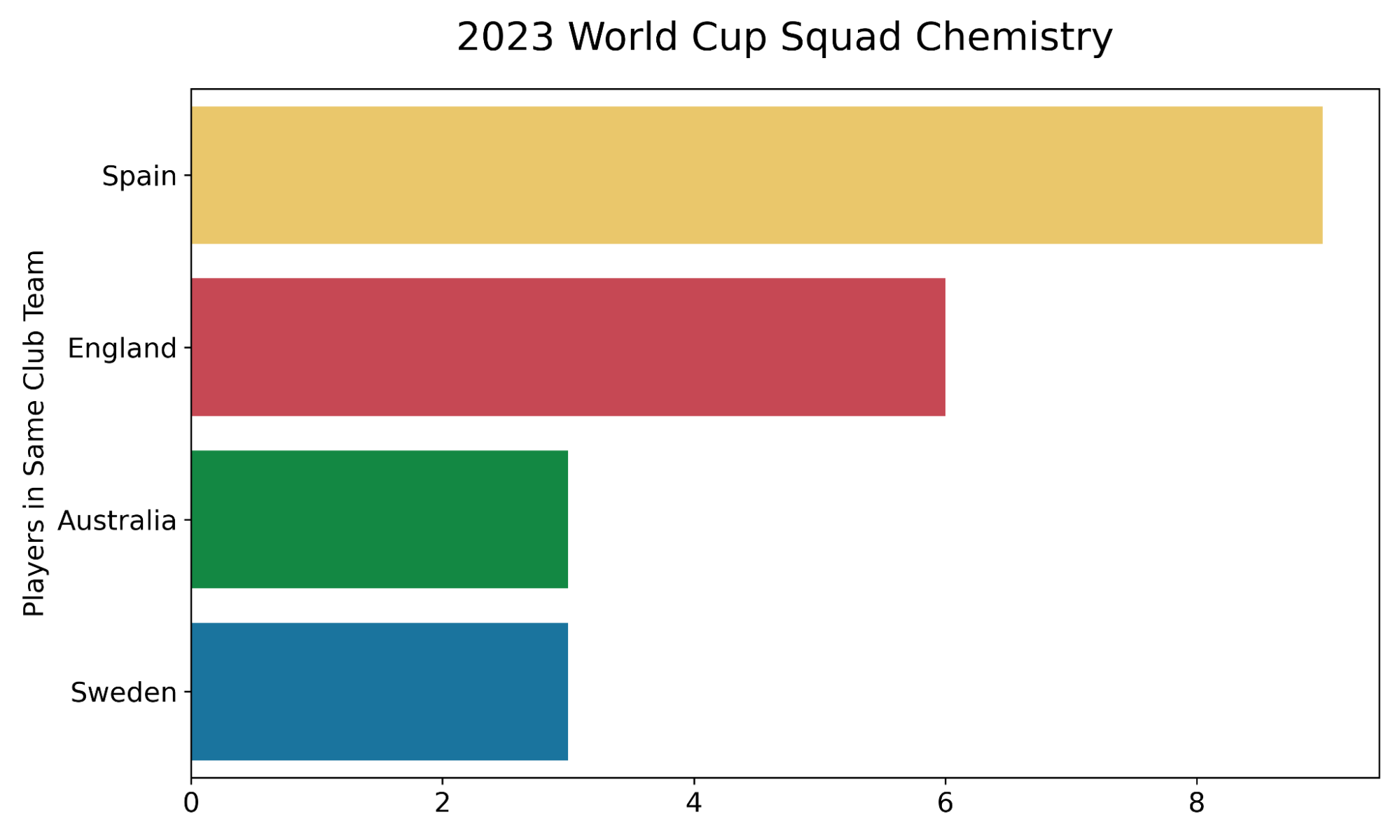
The largest cohort of the team won the Champions League Final at the beginning of June – they know what it takes to win, and they will be bringing that experience forward into the final two games of the World Cup.
This squad has also bossed the game in each of their matches, averaging over 70% possession over the course of the competition.
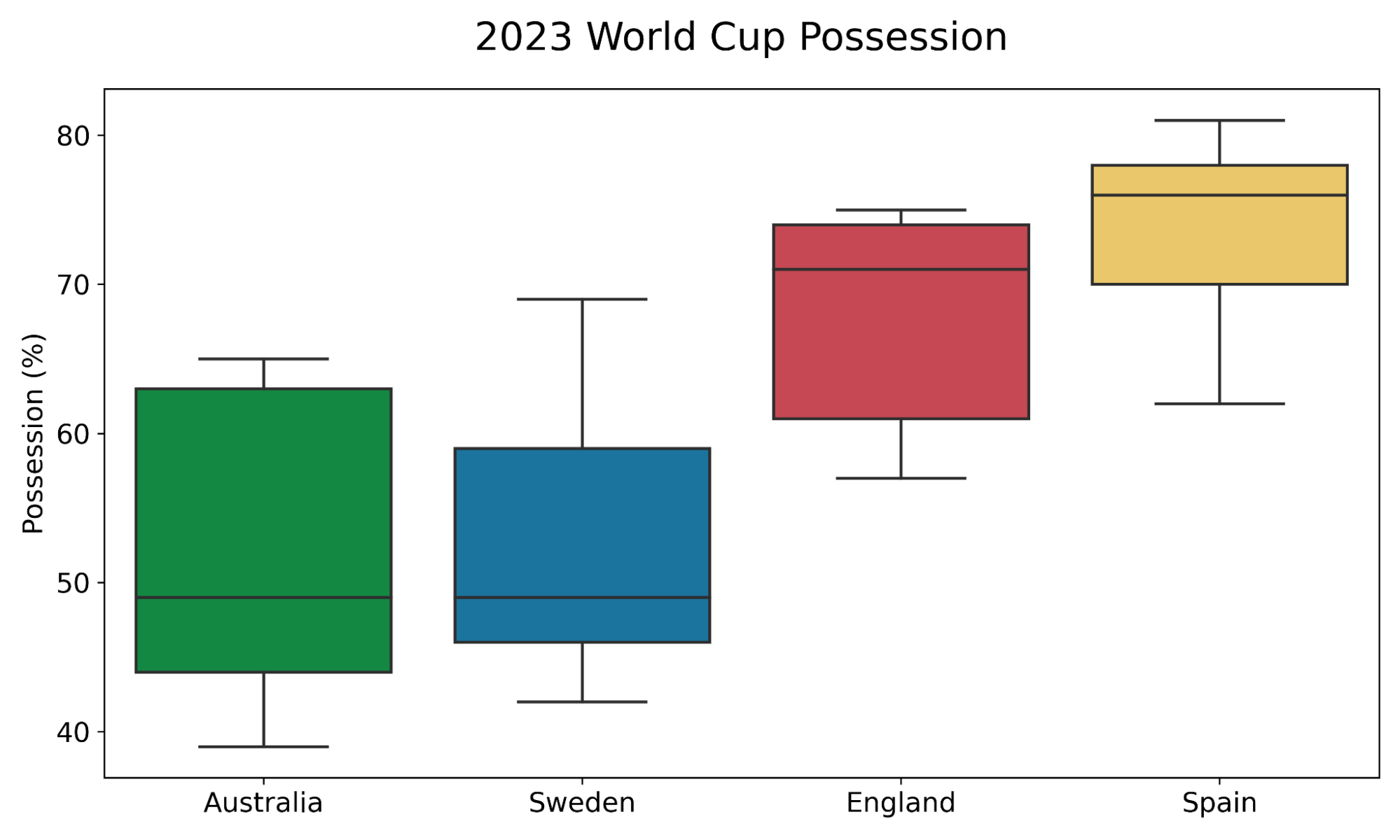
Spain also has an elite set of goalscorers and support for those goalscorers – more than any of the other semi-finalists. These players have created and scored goals at an elite level coming into the tournament, and have also performed during the FIFA WWC. Spain have scored the most goals and created the highest number of chances of any team remaining in the competition.
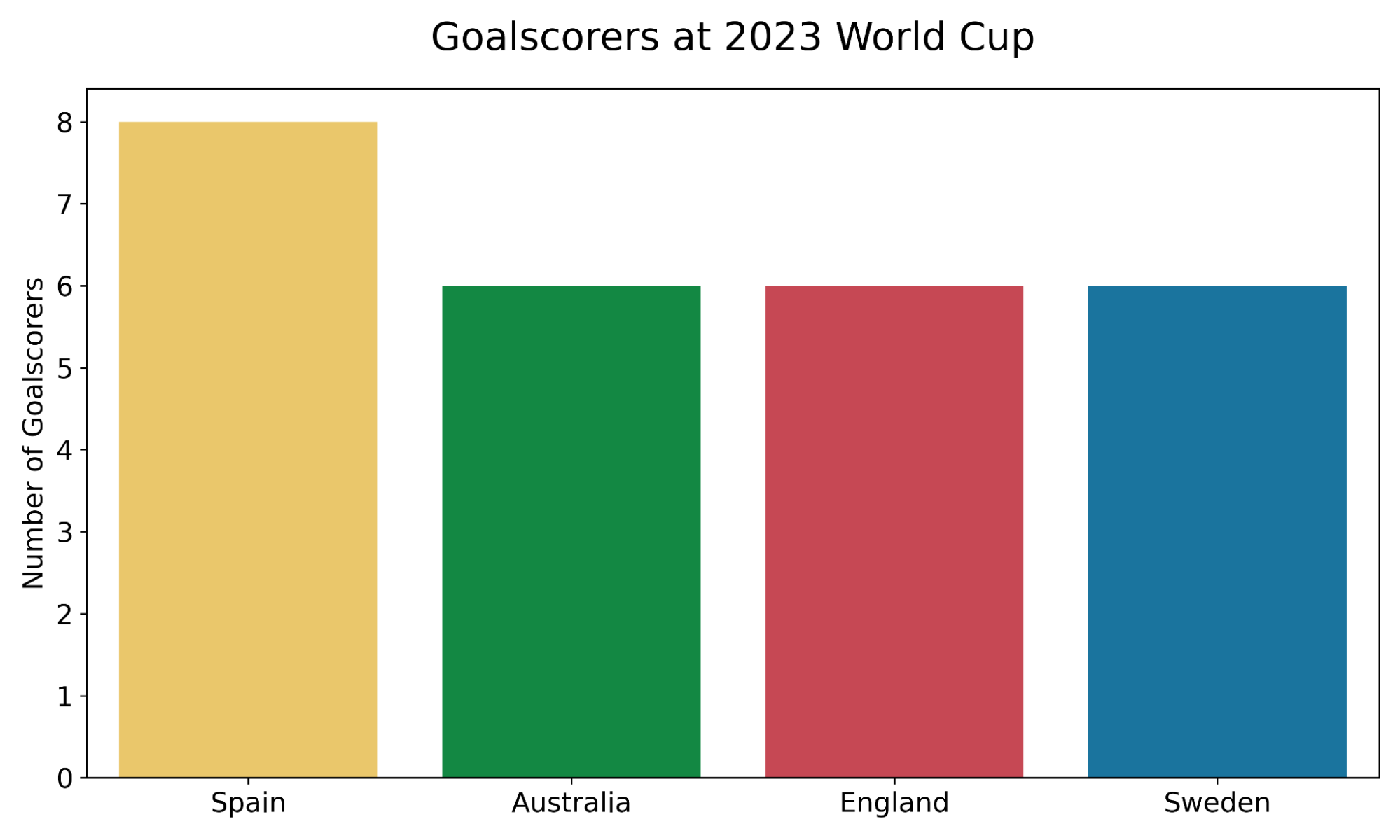
With 8 goalscorers and 6 players having given assists this tournament they are most well insulated against an off-day from any individual player.
Spain have utilised a great rotation policy in this tournament. Almost all their players have seen some form of action in the tournament, and the majority of their squad should be fresh going into the Semi Finals. They have achieved this by maximising their substitutes in the tournament, something they have been able to do because the quality of the substitutes is higher than anyone else in the tournament. Their players have also been the youngest cohort of the remaining teams. These fitter, fresher players are going to be able to show their greater quality in the most important moments of the Semi’s and the final.
See detailed breakdown here
Sweden

Two words to describe why Sweden are going to win this world cup – set pieces. Sweden’s strength comes from their physicality. On average their players are taller than 75% of other players left in the tournament. This gives them an advantage over the opposition any time the ball is in the air and in any dead-ball situation, something they have used to devastating effect. 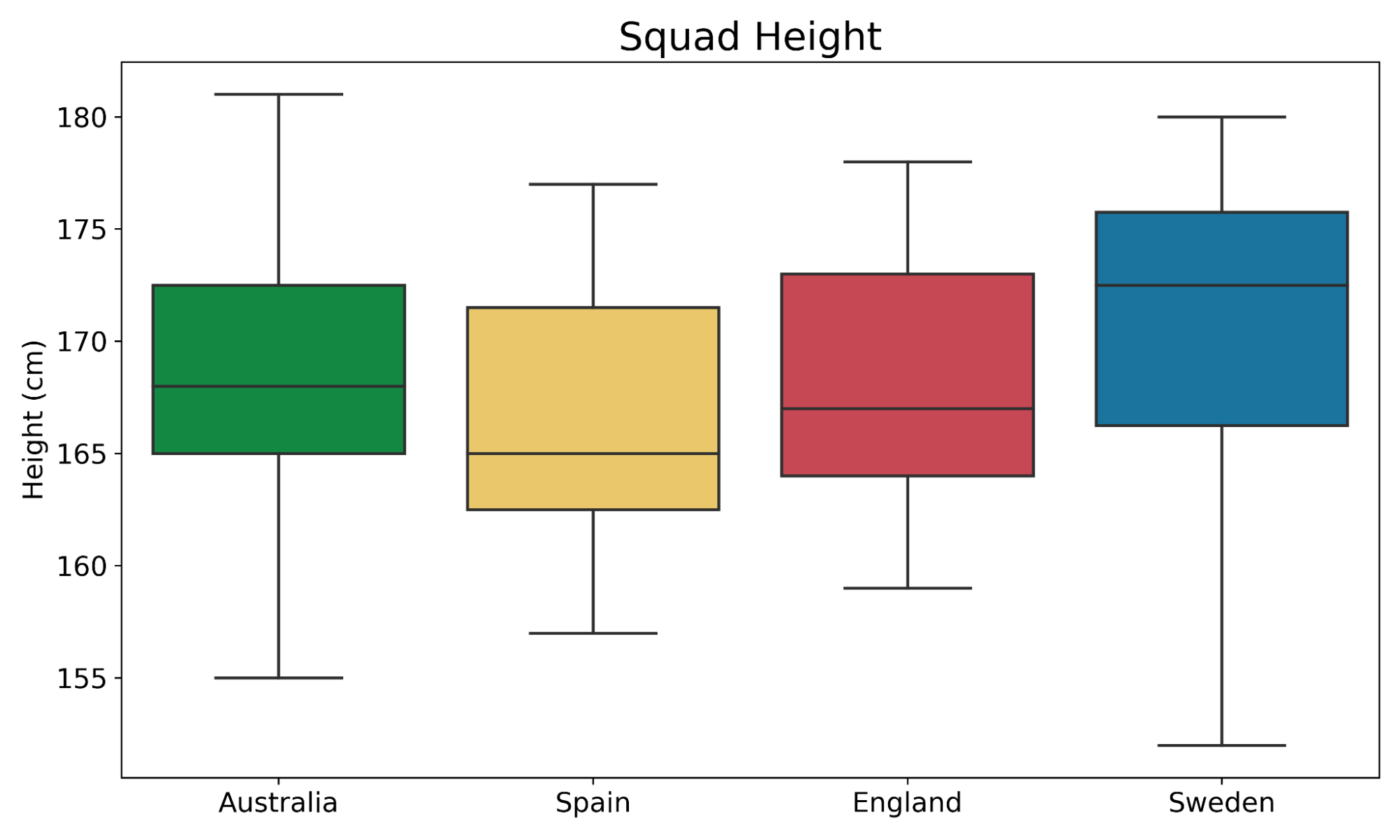
Of their 11 goals, 7 have come as a result of set pieces. Four goals have been scored directly, two penalties have been won, and a further goal has come from post-set-piece chaos. Amanda Ilestedt, a centre back, is their top scorer with four as a result. Clearly, Sweden’s height is too much for their opponents to handle.
Sweden are the most experienced team left in the tournament. They have wise heads that have done it at international level before. Experience is going to be crucial at the business end of this tournament. While tiredness can sometimes be the downfall of older sides, this isn’t a concern for the Swedes.
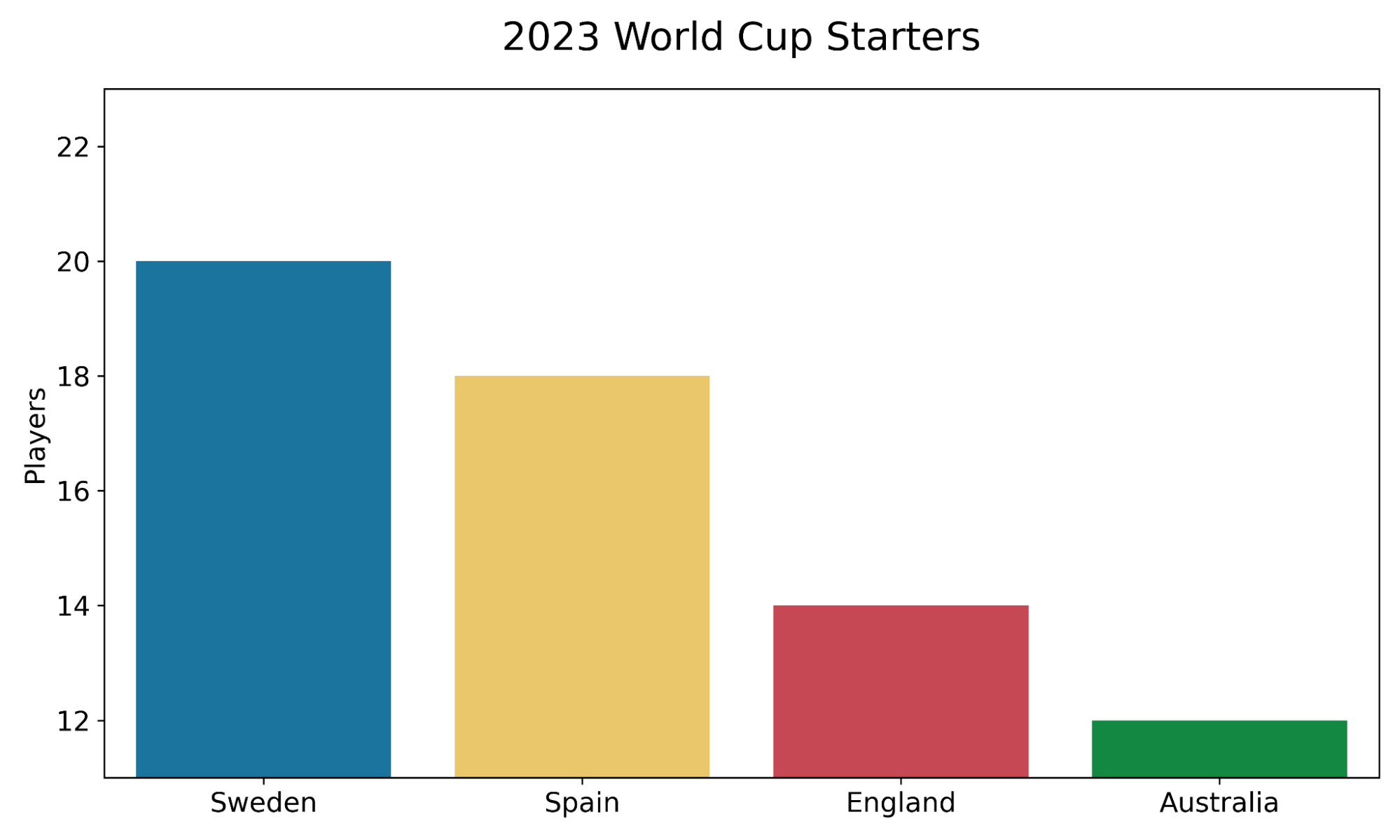
They got their business done early in the group stages and were able to rest players against Argentina. As a result, their players have played the fewest minutes in the world cup – Sweden are in a great physical condition to compete in the latter stages.
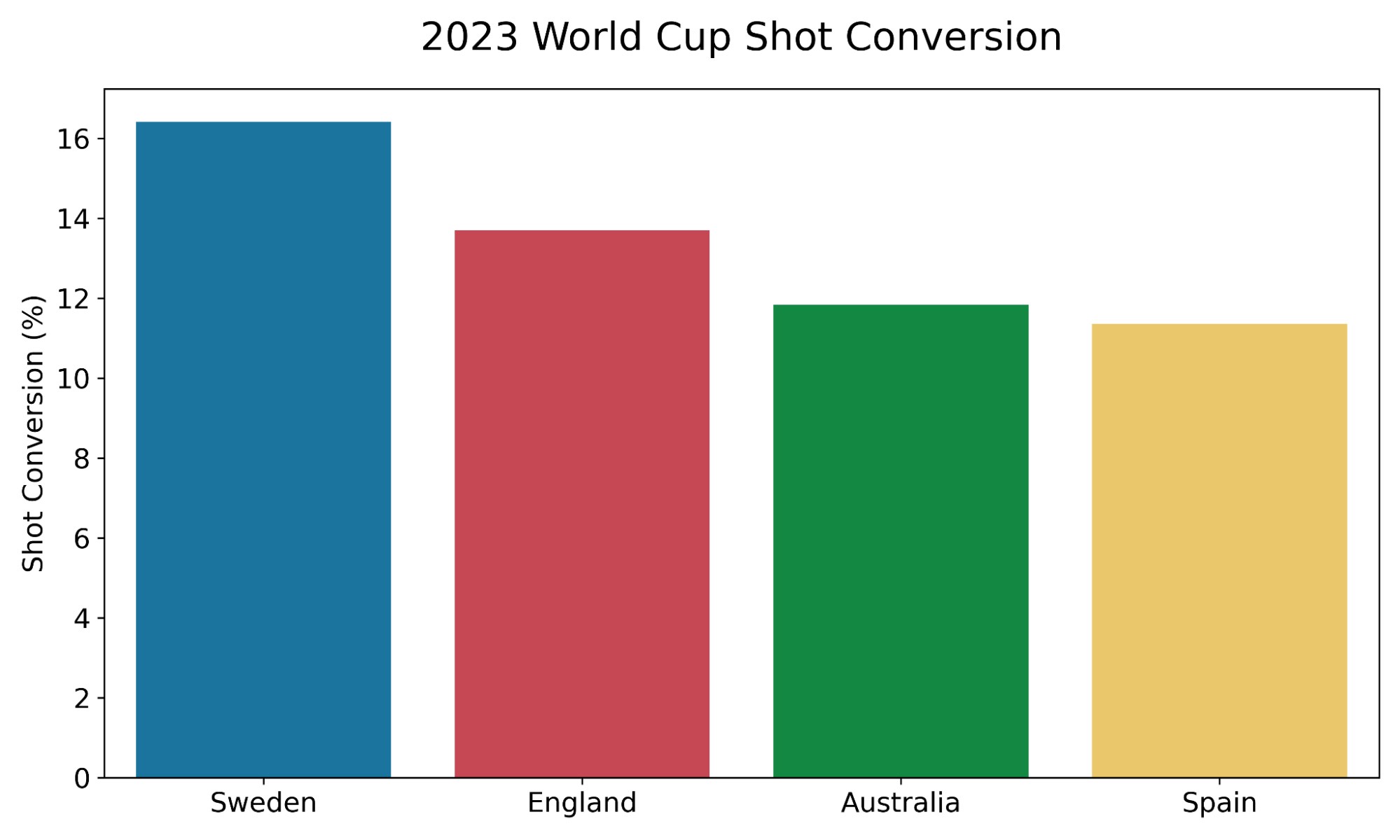
Sweden is not a side that needs to dominate the game or create many opportunities. Sweden are by far the most clinical side remaining in the competition.
They have the fewest goals conceded (2) and the best save percentage (conceding just 9% of shots on target). They do not need many chances to score a goal, and other teams need a lot of opportunities to put one in the net. They have an ideal matchup against Spain, who give up a lot of goals from few chances, and also have a poor conversion rate.
Sweden is the highest ranked side left in the competition, and is even outperforming what the FIFA world rankings would suggest. They have knocked out pre-tournament favourites, the USA, and just beat the previously highest performing team in the tournament, Japan. Sweden is a strong team, and they are clearly peaking during this tournament.
See detailed breakdown here.
Australia
The Matildas are going to win the World Cup because they have been preparing for this tournament since June 23th 2020 when they were announced as the hosts, and have developed a winning formula as demonstrated by their route to the semi-final.
Australia have put their focus on developing a core group of young players over the past years, giving them the tools to succeed in this world cup.

Australia has started only 12 players during the tournament, while 5 key players have played every minute of the world cup.
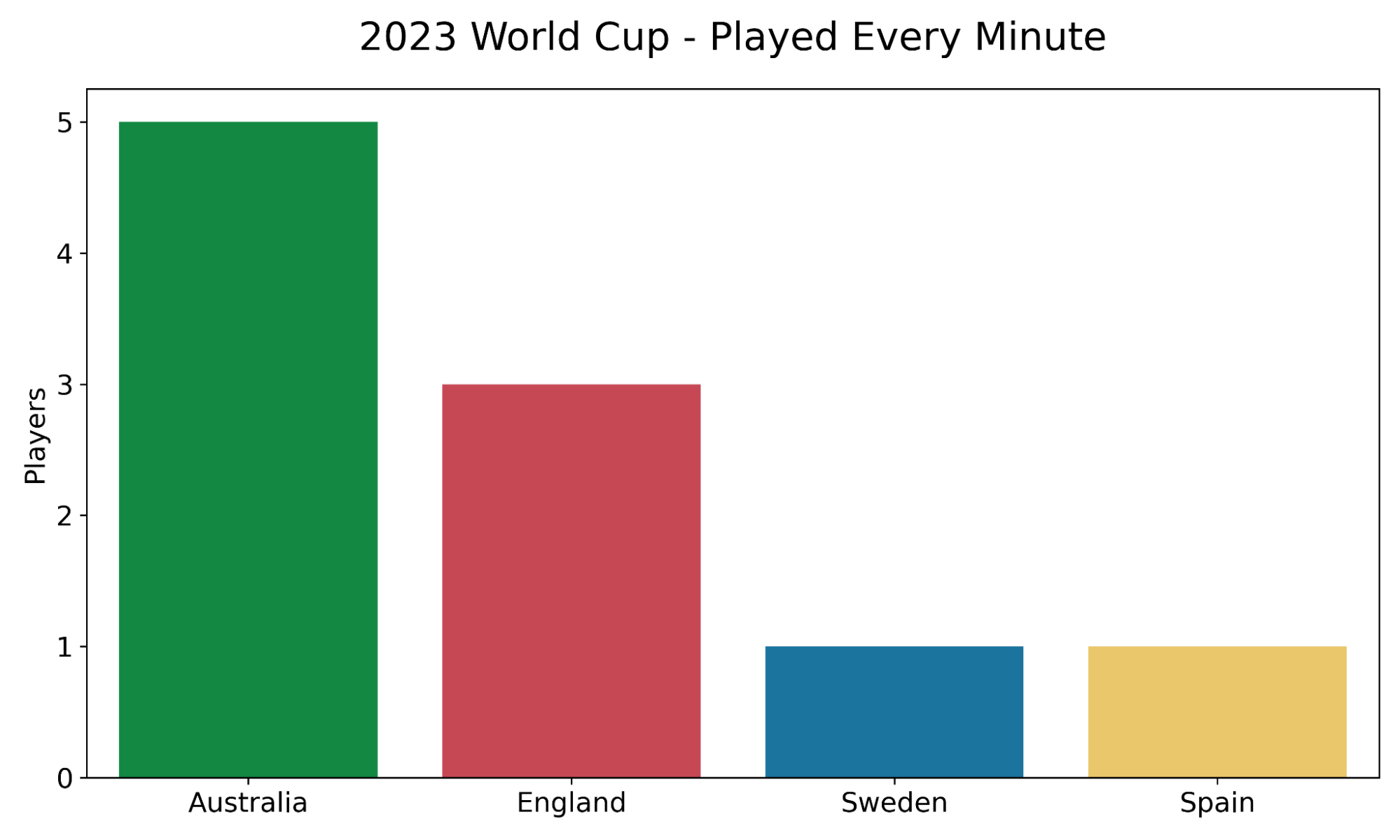
Despite the squad having 9 players with over 100 international caps, and having the joint highest number of caps on the field across each of their games, the age of the players on the field is second youngest of the semi-finalists.
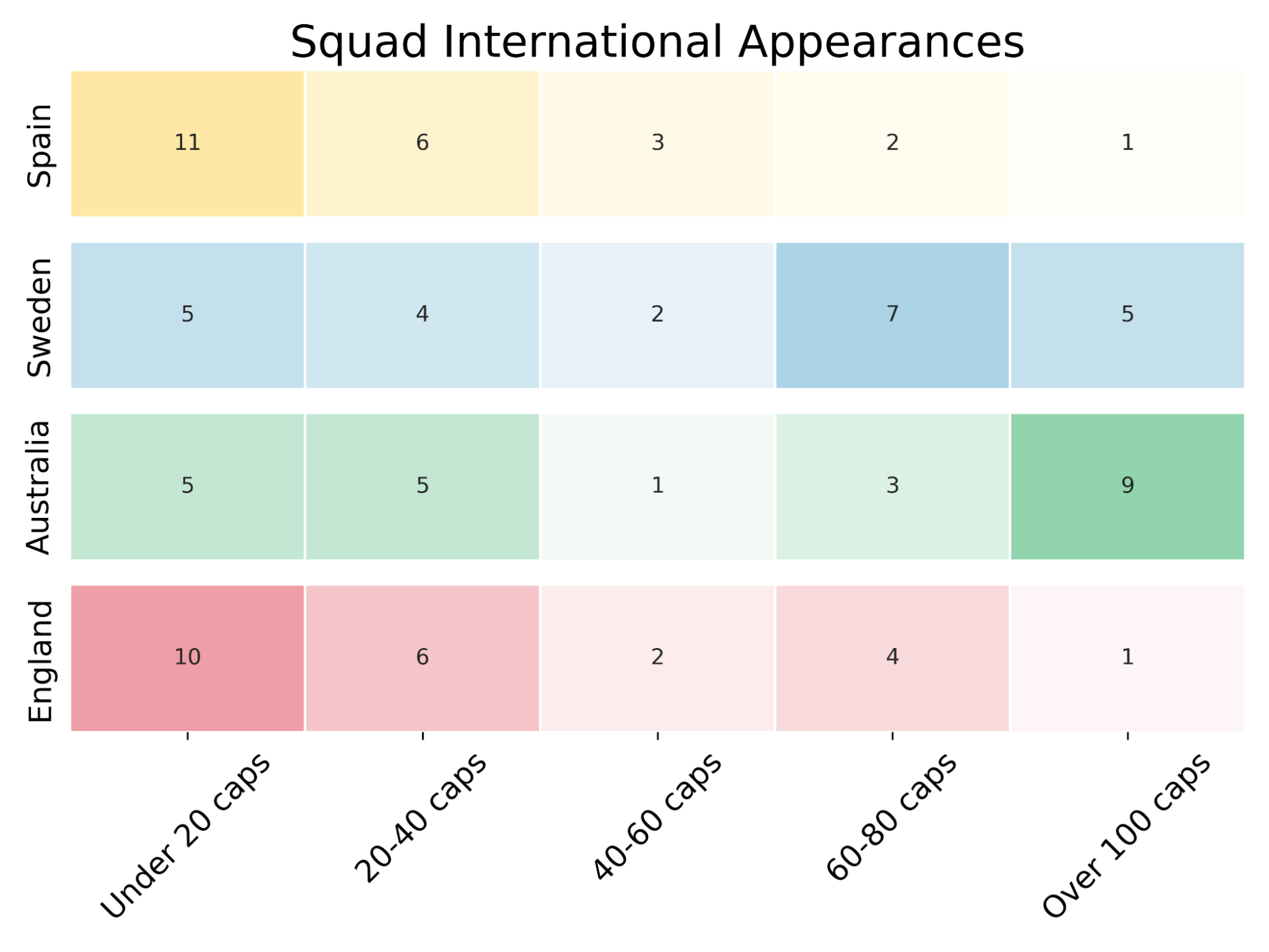
This is a cohort with the experience to succeed in a major tournament, while still having the youth required to manage so many matches in such little time.
To deal with the high number of minutes the players are required to play, preparation is also evident from before the tournament. Australia have the fewest players that have played a high number of minutes in the 12 months preceding the tournament.
The players have been well managed prior to the tournament to peak at the right time and have enough freshness to get through seven tournament games. Being one of two Australian-based sides going into the semi-final can surely only help here also, with no travel or time-zone adjustment being required between the semi-finals and the final.
Home-field advantage can be huge in football, and Australia are showing this to its fullest effect. They are outperforming their current FIFA ranking by a greater margin than any other team left in the tournament. With the added home-field advantage, according to the FIFA world rankings they should have leapfrogged Spain in terms of expectation, and be within touching distance of an underperforming England and third ranked Sweden. Over 80,000 passionate fans packed into Stadium Australia can be sure to amplify this advantage in both the Semis and Final.
Despite this being the Matilda’s first world cup semi-final, there can be no doubt of their credentials to be here. They have faced off against the strongest opposition of any of the remaining sides and have gotten through. They have found a way through when dominating the ball or when chasing the game.
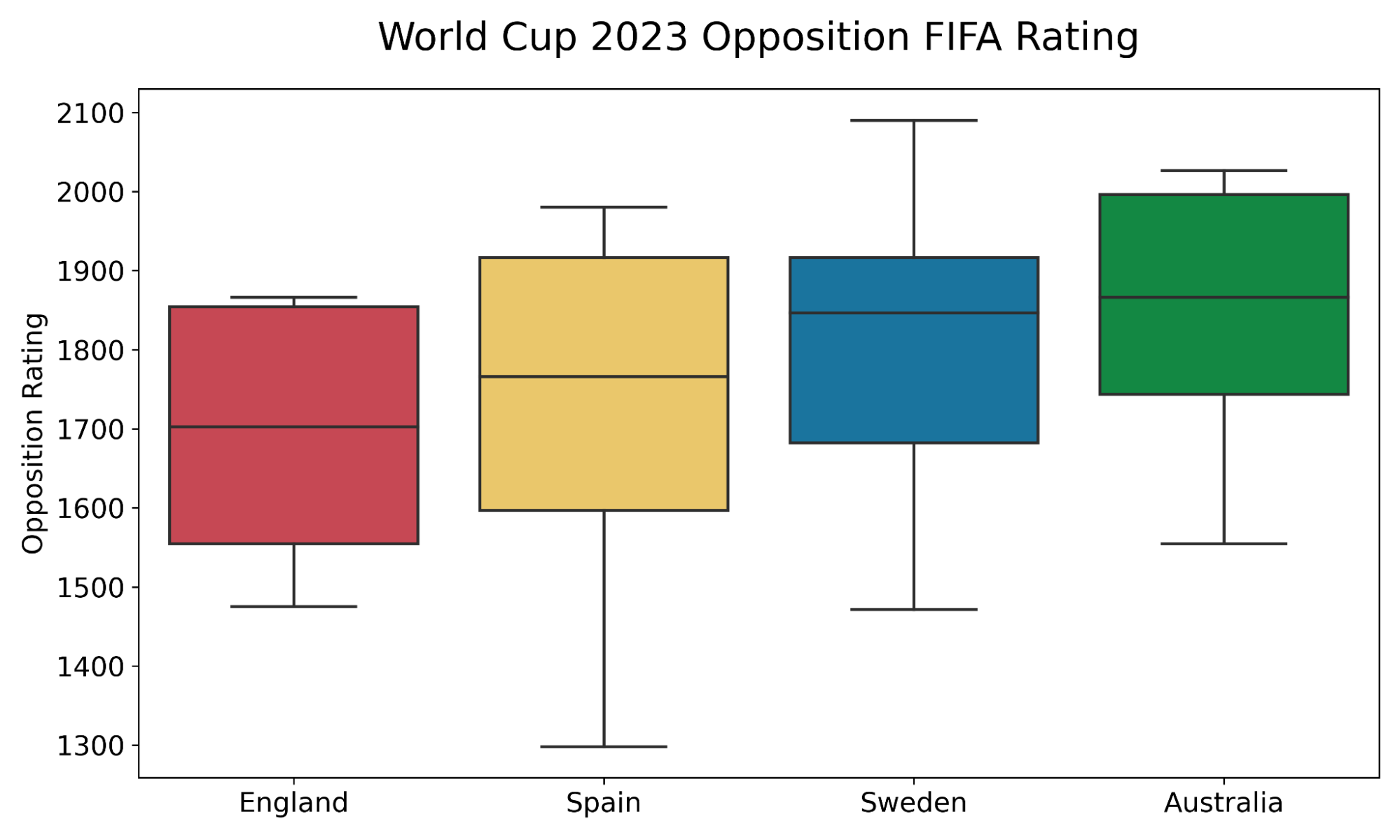
They have proven the ability to succeed in a variety of circumstances and against the quality of opposition they are facing from this point onwards – something that can’t be claimed of all the other semi finalists who to this point remain unproven.
See detailed breakdown here.
 England
England
England is going to win this World Cup because they have the most balanced squad left in the competition. They do not need superstar players to be world champions – instead, their key strength is for every player you take out of their starting team, the replacement is just as strong. None of their players are coming into the world cup undercooked, and the majority of their squad is in their peak years. Peak age players can go longer, and England have been able to save their depth for later in the tournament.
England have gotten to the semi-finals of the world cup without playing their best football. Their game has mitigated risk – limiting opportunities for opposition sides to difficult chances and leading to the lowest goals conceded in the tournament. They have dominated possession, but looked to create high quality opportunities. Coming into the tournament ranked 4th, they have underperformed thus far against weaker opponents, but their stats make clear there an opportunity for additional risk taking when the Lionesses face the toughest opponents of the tournament.
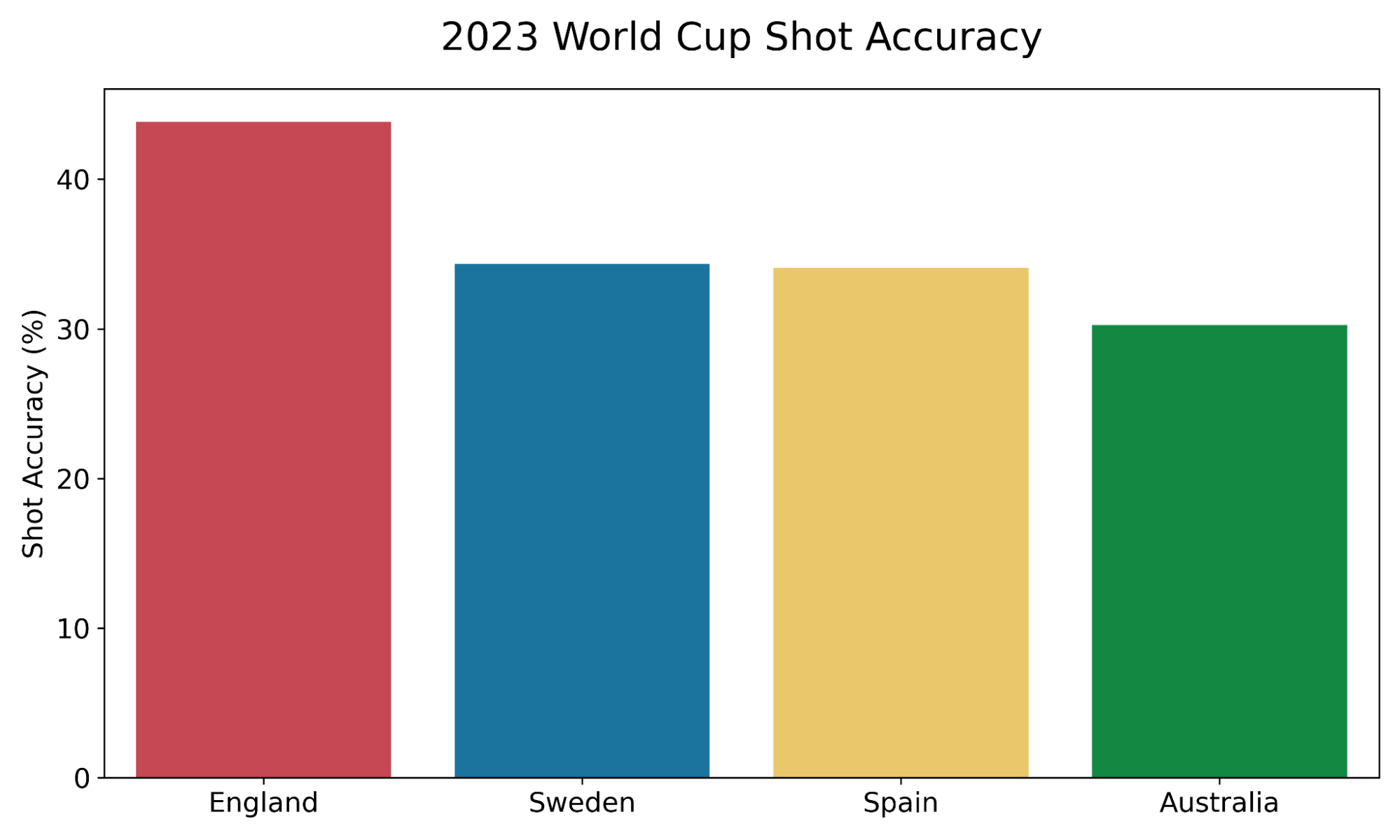
Many teams have peaked too early in this world cup – Japan and the Netherlands having impressive group stages but going out in the quarter-finals – and knowing what it takes to win and peaking at the right time can be precisely what is required to be champion.
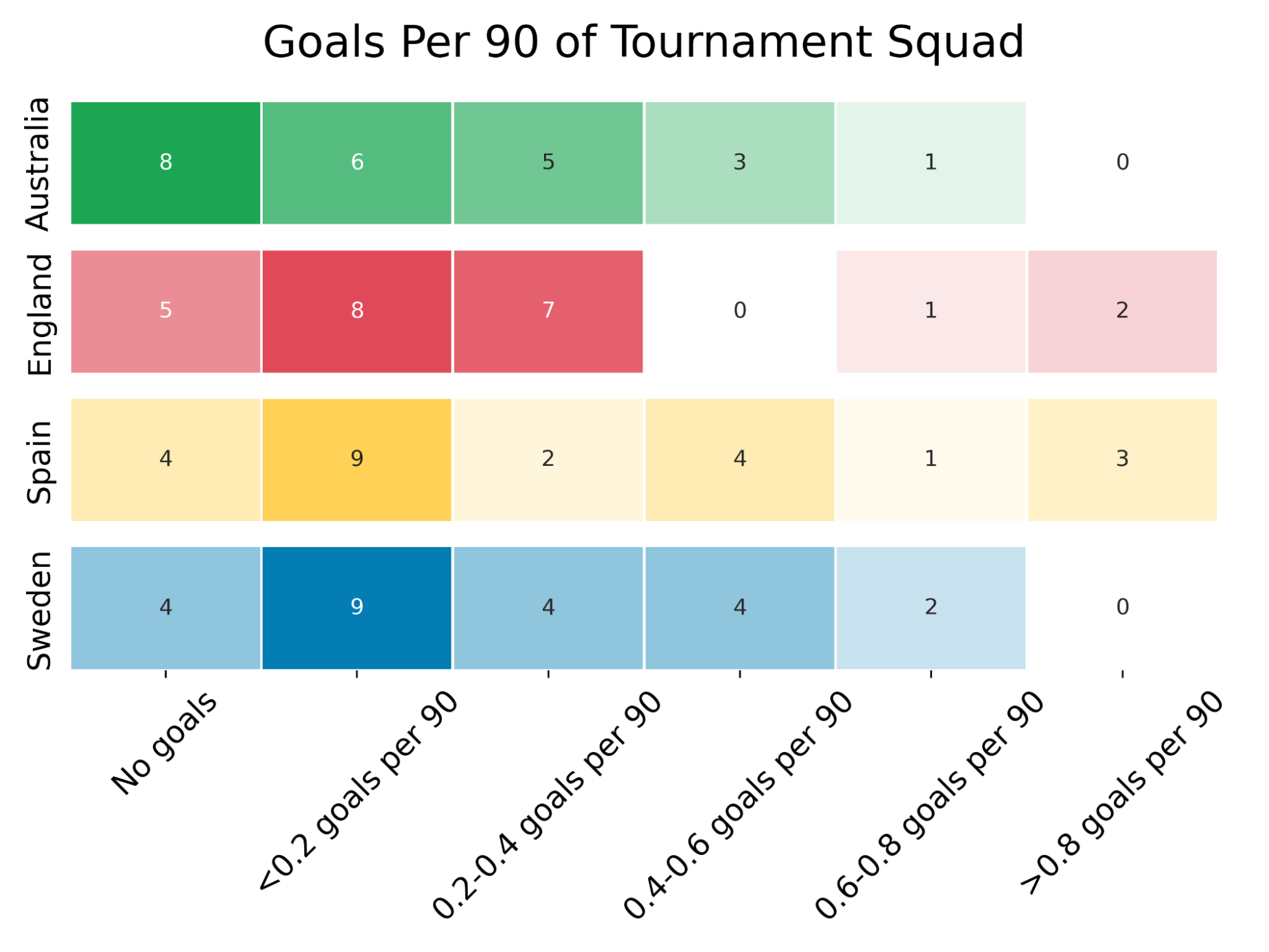
Beth England is the most prolific forward going into the tournament from any semi-finalist – she has mostly sat on the bench thus far in the world cup, but will be ready to pounce once England’s game plan adapts.
The Lionesses are European Champions and convincingly beat two of their fellow semi-finalists en route to that title. England and Sarina Wiegman (twice) are the only side to have masterminded a major tournament victory, and evidence suggests they have enough cards left unplayed to architect their way to football’s greatest prize.
See detailed breakdown here.
Conclusion
As we know, not all stats are created equal, and some of the factors that speak for each of the prospective winners are stronger than others. Recent research from the Kitman Labs Performance Intelligence Research Initiative (PIRI) has looked at some of the key performance factors that determine success in Football, albeit in the men’s domestic game.
Travel distance is the largest determinant of success when elite sides face each other, which certainly speaks for the winner of the second semi final having an edge in the final – the winner of the first semi travelling over 2,000km to reach Stadium Australia in Sydney. A team’s rating is also a large determinant of success, suggesting that England may be favoured to be the winner of this semi final. However, home field advantage, recent form, and line-up stability – all in favour of Australia – significantly nullify this advantage making Wednesday’s semi-final too close to call.
From the PIRI group’s analysis, Tuesday’s semi final seems more clear cut. Sweden has the better recent form and the higher rating, while all other factors that were under consideration in that work fall out equally. But, this is a fine example of analytics in sports being difficult. There will always be aspects of the game that we cannot quantify, or different contexts that change the most important factors underpinning performance which sometimes leads us to rely on learned experience. Our Kitman Labs Performance Experts suggest that team cohesion may be more difficult to develop in an international environment, and have pointed out that FIFA ratings may be volatile due to the sporadic nature of international fixtures. We cannot quantify the advantage that having won big knockout games may bring La Roja, nor have many of their young stars been around long enough for Spain’s FIFA ranking to be fully reflective of their quality. Whether this is enough to overturn an excellent Swedish side remains to be seen, but there certainly remain many strong arguments in favour of the Spanish.
Considering the chaos inherent to soccer, we acknowledge that while research provides valuable insights, the game often defies even well-founded predictions. The inextricable link between factors influencing.





